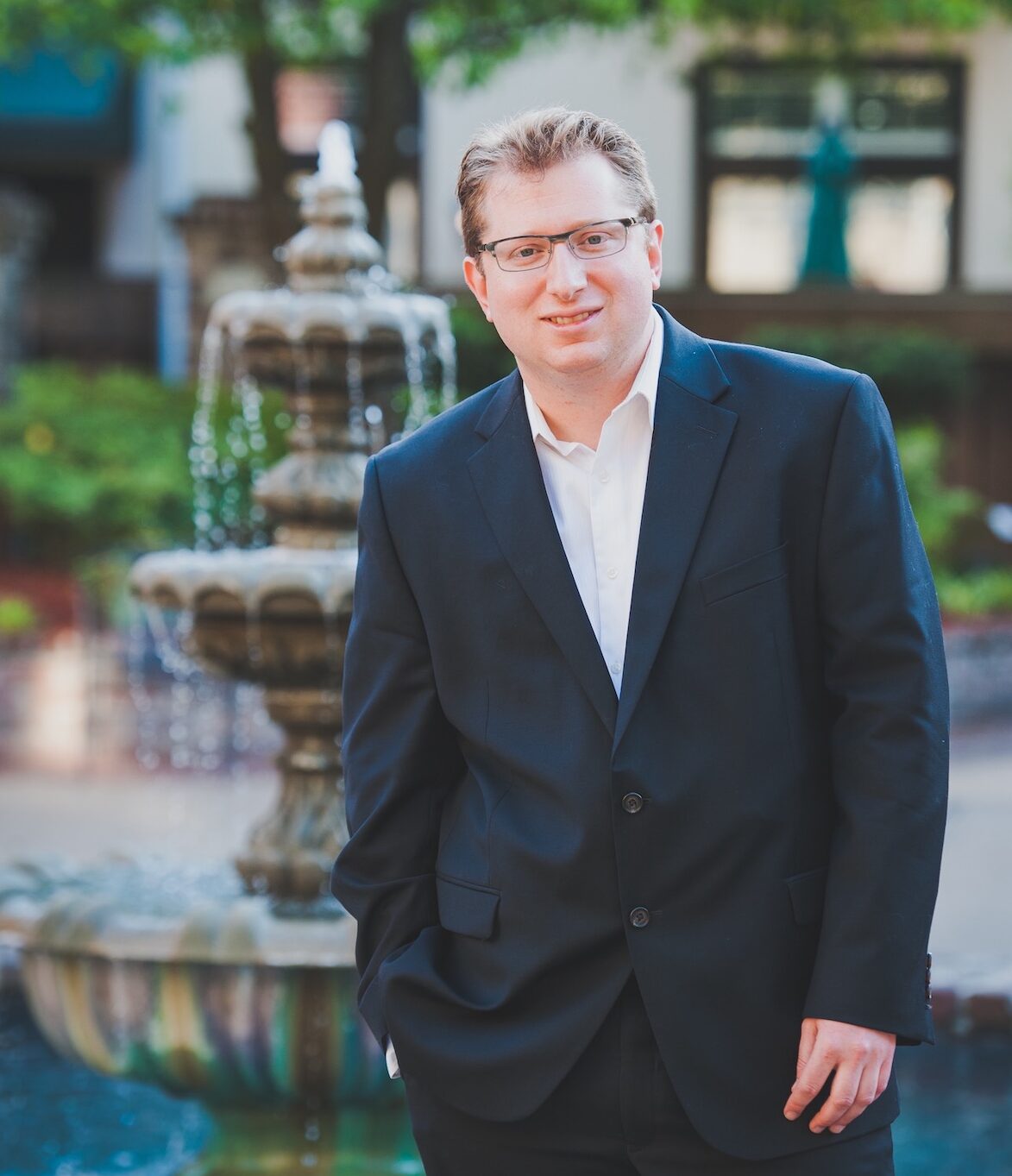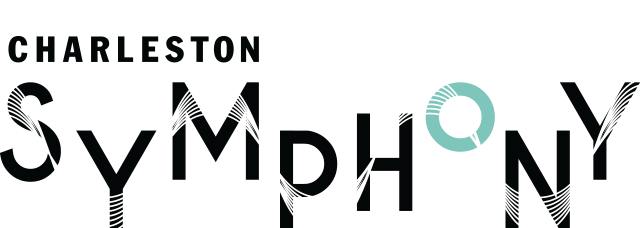
INSIGHTS
from CSO Artistic Director, Yuriy Bekker
Masterworks 8: The Titans
Hello friends,
I hope that this message finds you well and you are enjoying our beautiful Charleston spring. This is certainly my favorite time of the year. We have a fantastic weekend coming up with the season closer of our Masterworks series, which I have been looking forward to for over a year! As many of you know, our guest conductor this week cancelled due to health reasons. As soon as we heard about the cancellation, Charleston Symphony’s General Manager Kyle Lane and I quickly sat down and started thinking about who we could bring as a replacement. Finding a guest conductor, especially on such short notice, is a difficult task because I don’t want to bring just any conductor. I want to bring a conductor that is inspiring for both our musicians and our community. Within an hour of calling different agents, we identified a wonderful maestro who was available and very eager to come to Charleston: José Luis Gomez. Maestro Gomez is a renowned conductor and first prize winner of the prestigious Solti Competition. He is originally from Venezuela and is currently serving as music director of the Tucson Symphony. He has conducted major orchestras worldwide and is in high demand right now. I actually collaborated with Maestro Gomez in Spain as a guest soloist for a concert back in 2017 and I really enjoyed working with him. I know that our musicians and community will love his music making and energy.
A true highlight of this entire season for me is welcoming violinist Gil Shaham to Charleston. Gil Shaham is a legend. He is one of the top violinists in the world, performing regularly with leading orchestras like Berlin, New York, Boston, Chicago, Israel, and the list goes on. We are so honored that Gil agreed to perform with our orchestra playing Erich Korngold’s Violin Concerto. In the mid-1930’s, Korngold had the opportunity to leave his home in Austria and settle in Hollywood to write music for films. This move ultimately saved his life as Korngold was Jewish and escaped early into the rise of the Nazi regime. His violin concerto is absolutely sublime and contains quotations from several of his own Hollywood film soundtracks, including Another Dawn. The harmonies and the writing are so lush and warm – it is truly a masterpiece and an audience pleaser. I was fortunate enough to have Gil Shaham as my chamber music coach when I was a student at the Aspen Music Festival. Not only is he an amazing violinist, but he is also such a kind person. My chamber group learned so much from him that summer. I cannot wait to reconnect with Gil and for our community to hear this incredible violin star.
The main work on the program is Gustav Mahler’s first Symphony, which is nicknamed “Titan.” Mahler once said, “a symphony must be like the world and must contain everything,” and this is certainly true for his symphonies. They require massive forces, and for this performance, we will have larger than usual wind, brass, and percussion sections, as well as augmented string counts. Mahler had a specific sound in mind, and he achieved it by increasing the number of players. It will be an unforgettable experience to hear the resonance of sound of our huge forces in the acoustically superb Gaillard Center. This symphony features elements of nature with cuckoo calls heard in the first movement. The second movement is a ländler, which was a popular dance in Austria and Germany at that time. All of Mahler’s symphonies include a funeral march, and in the third movement of his first symphony, the funeral march begins with a double bass solo on a minor theme of “Frère Jacques.” Mahler was an innovator and not many composers give a solo to a principal bass player. The funeral march then transforms into a Klezmer motive. Growing up in Bohemia, Czech Republic, Mahler’s apartment was close to the main square and when he opened his windows, he would hear different bands playing for funeral marches and celebrations. He incorporated these experiences into his symphonies. The final movement is the most complex and, according to earlier drafts of this work, it is about destiny and heroism. Mahler had a complicated life surrounded by family tragedy and a heart condition, which greatly impacted his music. The ending of Symphony No. 1 is massive and triumphant, making it the perfect finale for our wonderful 22/23 season. I hope you have enjoyed the journey with us this season. It was certainly a memorable season for us, and we cannot wait for more excitement in 23/24! Thank you so much for supporting the Charleston Symphony!
Musically Yours,
Yuriy Bekker
Masterworks 6: Tchaikovsky’s Piano Concerto
Hello friends,
I hope you are enjoying Charleston’s recent bout of warm weather! I know that I am (except for all the pollen). There is so much to tell you about this week’s program, but first I wanted to mention how thrilled the entire orchestra is about our long-awaited CD release, Under an Indigo Sky, featuring Edward Hart’s music. We will be selling physical copies at the concert on March 3 and 4 and I hope you will visit us to get your disc signed by me and Edward. This recording project is a significant accomplishment for the entire organization. We strongly believe that the CD will give our orchestra critical national and international exposure, and hopefully bring us some important accolades. We just received our first review, and it is very complimentary!
Our upcoming Masterworks will be fantastic. We are so excited to have three terrific guest artists. Sarah Hicks, the guest conductor for this week, is a very dynamic and in-demand conductor. She regularly conducts the world’s top orchestras such as Los Angeles, Cleveland, Philadelphia, Toronto, Minnesota, Tokyo, Koln, Melbourne, and the list goes on. Most recently, Maestro Hicks received an Emmy as a producer and conductor. I have never worked with Sarah, but her reputation is wonderful, and I knew when planning the season last year that she would be a great guest conductor for our Masterworks.
We will open the concert with Fate Now Conquers by up-and-coming composer Carlos Simon. Simon is currently Composer-in-Residence for the John F. Kennedy Center for the Performing Arts and frequently writes for the National Symphony Orchestra. His work was inspired by a Beethoven journal entry quoting a passage from the Iliad (which begins “But fate now conquers”) as well as the slow movement of his seventh symphony. According to Carlos Simon’s notes about this work: “I have composed musical gestures that are representative of the unpredictable ways of fate. Jolting stabs, coupled with an agitated groove with every persona. Frenzied arpeggios in the strings that morph into an ambiguous cloud of free-flowing running passages depict the uncertainty of life that hovers over us.” Beethoven struggled with his own fate and his inclusion of the Iliad’s passage in his journal likely mirrors his feelings at the time. I hope you enjoy this profound and exciting work that is part of this year’s Project Aurora.
As for our piano soloist, we have been anticipating this moment for a long time and are so excited to welcome Van Cliburn Competition Gold Medalist, Olga Kern, to perform Tchaikovsky’s beloved Piano Concerto No. 1. Olga Kern is a big name in the classical music world and her playing is absolutely breathtaking. Listening to her play with such accuracy and musicianship just transports you to another world. I know it will be an extraordinary experience for you to hear her play this treasured work with our very own Charleston Symphony. Below is a link to one of her recent performances. I was so inspired when I heard this recording and I’m just delighted that our orchestra and audience will get to experience Olga’s superb artistry.
The final work on the program is the cantata from Alexander Nevsky by Serge Prokofiev. Our orchestra will be joined by the CSO Chorus, the College of Charleston Chorus and mezzo-soprano soloist, Ann McMahon Quintero. Born in Ukraine, Prokofiev left the former Soviet Union around the time of the Revolution to pursue opportunities in the west. He even lived in the United States for some time but missed home and returned to the Soviet Union in 1936. Like Shostakovich, Prokofiev’s music was affected by Stalin’s dictatorship. Stalin asked Prokofiev to compose music for a film by Eisenstein about Alexander Nevsky to unite the Russian people as they were about to enter World War II against Germany. The film is about the defeat of the Teutonic Knights by Nevsky and the people of Novgorod in the 13th century. The climax of the work is the famous battle on the ice. It is very eerie and at the end of the scene, the ice cracks, and all the invaders fall through the ice to their death. The film and its music are an important time capsule to a period in history that relates to us today.
Prokofiev died 70 years ago this weekend (March 5, 1953), but his passing was completely overshadowed by Stalin, who died on the exact same day. In the Russian newspaper “Pravda” there was a big tribute to Stalin since the broader population at that time was unaware of all the terrible things he had done. Prokofiev’s death announcement was very small and placed somewhere in the middle of the paper. It has been one year since Russia invaded Ukraine and, were he alive today and had the ability to compose freely, I believe Prokofiev would have written this piece as a summons to his own people of Ukraine. This weekend and always, our thoughts are with the people of Ukraine.
Musically yours,
Yuriy Bekker
Masterworks 5: Daphnis and Chloe
Masterworks 4: Beethoven & Tchaikovsky
Masterworks 3: The Charleston Sound
Dear Friends,
I can’t believe it is November already and we have another terrific Masterworks concert in store. This week, “The Charleston Sound” returns home, celebrating the Lowcountry and our musical roots. Every piece featured has ties to Charleston and this is also the premiere program of our exciting new venture, Project Aurora, spearheaded by CSO’s Associate Conductor Kellen Gray. The purpose of Project Aurora is to recognize and elevate African-American arts and culture through our performances. The selections we will perform are so beautiful and moving, I just know that this will be a concert to remember.
We have a large and fabulous lineup of guest artists joining us this week. Guest conductor Chelsea Tipton is not at all a stranger to the Lowcountry. His career started with the Savannah Symphony and he has actually conducted our Charleston Symphony years ago. Maestro Tipton is currently Music Director of the Symphony of Southeast Texas and regularly conducts major orchestras such as Cleveland, Houston, Detroit, Nashville, and many others. He is an exciting conductor and wonderful musician, and we are so happy to have him lead this program. Our guest vocalists begin with internationally renowned soprano, Indira Mahajan, who will be joined by amazing baritone and friend to Charleston audiences, Jason McKinney. When you hear these voices, you will be blown away by their power and beauty. Jason and Indira will be featured in Porgy and Bess: A Concert of Songs. They have both sung their respective roles hundreds of times in opera houses all over the world. It will be such a treat to hear them perform this incredible music for us, music born here in Charleston. Jason and Indira will also be featured in Tippett’s Five Spirituals where they will join forces with two local vocalists, mezzo soprano Jennifer Luiken and tenor Harold Meers. Harold and Jennifer both have remarkable careers, and we are so fortunate to have their talents within our community. In addition to our amazing solo cast and a very large orchestra for this concert, we will have three choruses on stage. Our Charleston Symphony Chorus will be joined by the award-winning Claflin University Chorus and the College of Charleston Concert Choir. It will be thrilling to have over 200 musicians and singers on the beautiful Gaillard stage – a feast for your eyes and ears!
The selections in this program will take you on a musical journey – some moving, some fun, all beautiful, and all Charleston. It will open with a lighthearted rendition of The Charleston by James P. Johnson, followed by Sir Michael Tippett’s Five Spirituals from A Child of Our Time. Tippett’s spirituals are mesmerizingly beautiful and will feature the three choruses and our four solo vocalists. Duke Ellington’s Black, Brown and Beige suite is next and is just so much fun. Duke Ellington actually came through Charleston on concert tours and recruited musicians from the local Jenkins Orphanage to join his band. The Jenkins Orphanage was run by Reverend Daniel Jenkins, father of our next composer, Edmond Thornton Jenkins. As a black musician in the early 1900’s, Edmond Thornton had a complicated relationship with Charleston and did not have opportunities here. He moved away to study music at the Royal Academy in London, eventually settling in Paris. While in Europe, Jenkins composed his Folk Rhapsody: Charlestonia. Although this music was written in Europe, the sounds and feelings of Charleston permeate the piece. It is a truly wonderful work! Finally, we end the program with selections from Gershwin’s opera Porgy and Bess. Gershwin spent many summers in Charleston, both downtown and on Folly Beach. When you hear the music of Porgy and Bess, you can hear the tremendous impact of the Charleston sound and African-American musical roots on his music. Our own Charleston Symphony actually toured all over the US and to Israel with David Stahl in the 1990’s to perform this opera. While cities all over Europe lay claims to the music of their renowned composers, in Charleston we can claim Porgy and Bess and the music of Edward Thornton Jenkins. We are so excited for you to hear Charleston’s music performed by Charleston’s symphony.
As we are just a few days away from the Thanksgiving holiday, I would like to wish you a wonderful Thanksgiving. I hope you enjoy every moment with your families and friends. This Thanksgiving, I am so thankful that we have music in our lives and for your support of the Charleston Symphony!
Sincerely,
Yuriy
Masterworks 2: Beethoven’s Triple Concerto
Dear friends,
I hope that you are having a wonderful fall. I am writing this after spending one week in the mountains with my family. It was actually quite a musical retreat for me – a chance to catch my breath, practice lots of scales, and put some finishing touches on Beethoven’s Triple Concerto which you will hear this weekend.
I am completely thrilled about this week’s program. In addition to Beethoven’s Triple Concerto, you will also hear Shostakovich’s monumental 10th symphony. To lead this program, we are excited to welcome guest conductor Andrew Litton. I met Maestro Litton almost 10 years ago in January of 2013 when I got a sudden call from Ulster Orchestra in Belfast, Ireland. The orchestra was in last-minute need of a guest concertmaster and, on 5 days notice, I flew to Ireland to perform a quite demanding program. The guest conductor for that program was Andrew Litton! Maestro Litton and I hit it off from the beginning and it was clear to me that we were very musically compatible. I have such fond memories of our rehearsals and performances of selections by Bruch, Strauss, and Rossini. Andrew and I stayed in touch and he was one of my first calls when I became artistic director and had the privilege to invite guest conductors. Maestro Litton is a well-known conductor. He is currently the music director of the New York City Ballet and has previously held directorships for Dallas Symphony, Bournemouth Symphony Orchestra, and Bergen Philharmonic. He has made over 140 recordings and won a Grammy. It is a great honor to have someone of such worldwide acclaim here in Charleston.
In a fun twist to the night, Maestro Litton will simultaneously play the piano as soloist while conducting Beethoven’s Triple Concerto. Few people in the world have the ability to conduct from the keyboard as it is no easy task. Extraordinary cellist Christine Lamprea will join us as our second soloist. Ms. Lamprea was the winner of the 2013 Sphinx competition and has since become a star in classical music world. She is soloing with major orchestras worldwide and we are so glad to welcome her to Charleston. I can’t wait to join them both on the violin to round out the “triple” and, now that I have polished the concerto, I feel quite ready. The Triple is so much fun to play. While it gives all three solo instruments an opportunity to shine, it is also balanced with extended orchestral sections that will give our orchestra an opportunity to play.
Now a little about Shostakovich Symphony No. 10… When Litton offered to program this monumental work, I had absolutely no reason to say no because it is an incredible opportunity for us all. Early in his career, Litton’s mentor was esteemed cellist and conductor Mstislav Rostropovich, who was Shostakovich’s student and friend. I know that Maestro Litton’s interpretation of this symphony has been passed down from this great musical giant and that it will be authentic to the composer’s wishes. The music is incredibly moving and my words cannot begin to describe it. You simply have to come and hear it for yourself. Shostakovich composed this symphony right after the death of Josef Stalin in March 1953 and it centers around the terrible regime of this dictator. It is estimated that about 20 million people died during Stalin’s regime. People who spoke out against the government or had any alternative ideas that might threaten the government would be taken away and likely murdered. Artists and composers, like Shostakovich, were particularly in danger because they often expressed themselves through their art. You can hear the terror and fear of the Russian people in the music.
I particularly love the creativity of the third movement and the introduction of a signature musical motive of Shostakovich. It is an eerie waltz containing the musical cryptogram D-E flat-C-B (in German notation, D-S-C-H) from the German transliteration of his name, Dmitri Schostakowitsch. While most of the symphony’s music conveys despair, tragedy, terror, and violence, it ends in a triumphant finale with this motive at the forefront. Shostakovich, as an oppressed artist under Stalin, asserts the individual’s triumph over a soulless, dehumanizing communist regime. Performing this work today is very fitting, especially with what is happening to the people of Ukraine under the Russian occupation and also to the Russians suffering under their current dictator. Being born in Minsk, Belarus and living the first 10 years of my life in the former Soviet Union, this really hits home. In our performance tonight, I will think about oppression, freedom, and democracy. Performing this work is a chance for us to remember why Shostakovich composed it, to stand with people who are under oppression in our modern world, and to celebrate our freedom.
Musically yours,
Yuriy
Masterworks 1: Elgar’s Cello Concert
Dear friends,
I am so excited to welcome you to our 2022-2023 season. Our season opens this weekend with Emmy and Grammy award-winning conductor Gerard Schwarz conducting Strauss’ Der Rosenkavalier along with his son Julian playing Elgar’s Cello Concerto – a truly remarkable family affair! Before every Masterworks concert, I am planning to write “Insight” notes. I wrote these preview letters when I was interim artistic director from 2010 to 2014, and so many of my friends enjoyed them that I decided to bring them back.
Maestro Schwarz is no stranger to Charleston. In February of 2015 he conducted our orchestra in a very memorable performance of Brahms Symphony no. 4. It was a spectacular concert and incredible experience for our musicians, which many of us still talk about. I reached out to Maestro Schwarz with an invitation over a year ago and was thrilled when he agreed to conduct our orchestra again. The main work on the program is a suite that Schwarz assembled from Richard Strauss’ opera, Der Rosenkavalier [The Rose Carrier]. The suite features all of the highlights from the opera in a symphonic setting, including selections from the waltz sequence, glorious moments from Octavian’s “Presentation of the Rose,” and of course, the famous trio section which is some of the most beautiful music ever written (in my opinion). I get goose bumps every time I hear this climatic moment.
In my fifteen years in Charleston, this will be my third time accompanying Elgar’s Cello Concerto and I look forward to its beautifully haunting melodies each time. Composed just after World War I, this was a deeply personal work for Elgar who was devastated by the effects and destruction of the Great War. Cellist Jaqueline du Pre was a big champion of the concerto. She helped put it on the musical map and establish its place in the cello repertory. We are delighted to present Julian Schwarz as our soloist for this iteration. He is an incredible musician and great talent with a gorgeous, big sound. I think you will love hearing him play. Julian was actually supposed to perform with our orchestra back in 2017 but the effects of Hurricane Irma delayed the concert and, unfortunately, the new date did not work for Julian. We are thrilled that we can finally bring him to play this beloved work under the baton of his father.
The opening work of the program is Umoja, written by iconic composer and flutist Valerie Coleman. Coleman is a gifted musician, composer and entrepreneur. Umoja was a commission by the Philadelphia Orchestra. We picked this as our opening work for Project Aurora, the symphony’s new endeavor to promote, preserve, and create African-American arts and culture, which will be woven throughout our season. Meaning “unity” in Swahili, Umoja was originally a simple song for women’s choir, which Coleman later rearranged into a woodwind quintet, and then finally transformed into an orchestral version through a commission by the Philadelphia Orchestra in 2019. In Coleman’s own words, “this version honors the simple melody that ever was, but is now a full exploration into the meaning of freedom and unity. Now more than ever, Umoja has to ring as a strong and beautiful anthem for the world we live in today.” Coleman masterfully promotes this important message in a musically beautiful and accessible piece that I know you will love. It is my great hope that our music and performances always bring out the best in our people and promote unity beyond the walls of our performance hall.
I truly hope that you will be able to come and enjoy this week’s opening night. Our orchestra is spectacular and this program will be a great start to a terrific season.
Musically yours,
Yuriy


